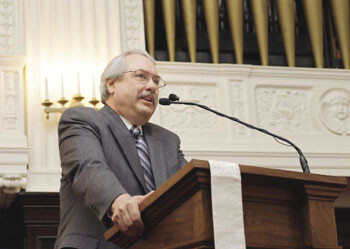
Birch retires after 38 years as Old Testament scholar
BY LINDA WORTHINGTON
UMCONNECTION STAFF
More than 200 people gathered April 14 to note the retirement of the Rev. Bruce Birch, dean of Wesley Theological Seminary and Woodrow W. and Mildred B. Miller Professor of Biblical Theology. Birch has served as an Old Testament scholar for 38 years at the seminary.
As part of the tribute, the seminary president, the Rev. David McAllister-Wilson, announced the new residence hall on the Mt. Vernon Place campus in Washington would be named the Bruce C. Birch Residence Hall.
Earlier that morning, at Mount Vernon Place UMC, Birch moderated an ecumenical panel of "some of the finest theologians" who reflected on the theme, "The Story of Salvation: Old Testament as Scripture of the Church."
 Walter Brueggemann, Katharine Doob Sakenfeld, Terence Fretheim, and David L. Petersen are all members, as Birch is, of the Society of Biblical Literature. Fretheim, Petersen and Birch co-edited "A Theological Introduction to the Old Testament" with a foreword by Brueggmann.
Walter Brueggemann, Katharine Doob Sakenfeld, Terence Fretheim, and David L. Petersen are all members, as Birch is, of the Society of Biblical Literature. Fretheim, Petersen and Birch co-edited "A Theological Introduction to the Old Testament" with a foreword by Brueggmann.
Each theologian spoke from his or her particular theological viewpoint on the day's theme.
According to Walter Brueggemann, professor emeritus of Old Testament at Columbia Theological Seminary in Decatur, Ga., Americans want to believe we can solve all economic, ethical and social justice problems through piety. A recurring theme of the Old Testament is the maintenance of hope, he said. Two of his recent works include "Prayers for a Privileged People" and "The Theology of the Book of Jeremiah."
Katherine Sakenfeld is "a pioneer in expanding our global perspective," Birch said as he introduced her. She is Princeton Seminary's William Albright Eisenberger Professor of Old Testament and the director of Ph.D. studies. A major work of hers is the Ruth Interpretation Commentary Series (1999) and she gave new insights into many of the characters in the Book of Ruth.
She told anecdotes to illustrate two views of the Bible, one the pietistic, literal viewpoint of some of her students at Princeton; the other, that a new Bible should be published that is "cut down to what is good today," with all no-longer-relevant references deleted.
To deal with the tension between these extreme viewpoints she suggested five strategies: read closely, noticing the gaps in what is said or not said; look at texts about women and be aware of diversity in the Old Testament; think about general ethical perspectives in the Bible; think about the intersection between the ancient and contemporary worlds; and experience interpretation of text from those with very different perspectives from one's own.
"There's never been a time when the Old Testament didn't create problems about God," said Terence Fretheim, the Elva B. Lovell Professor of Old Testament at Luther Seminary in St. Paul, Minn. "God is in control," is not in the Bible, he said, "but is assumed from the various interpretations of the Bible."
Who we are makes for differences in the way we see the God of the text and "becomes central to what we see God is about," Freitheim said. The contemporary diversity of Bible readers - more women, higher education levels - "has an immense influence on the way we interpret God," he said.
David Petersen, the Franklin N. Parker Professor of Old Testament at Candler School of Theology at Emory University, showed how contemporary events color the way readers interpret Scriptures. His first illustration was the 1956 film, "The Ten Commandments," still shown on TV during Holy Week, and his second was the swearing-in ceremony for President Barack Obama.
In the final scene of the movie, the exiles from Egypt are recast as pioneers crossing the Rockies to a new land, one of freedom and expansion. Obama lays his left hand on the cover of the closed "Lincoln Bible," a Christian book, unopened to any message. Obama says, "So help me God," not as an "amen," but "he seems to be asking for help," Petersen said.
"The church should be asking about the purpose of the presence of the Bible in the inauguration," Petersen said.
At the close of the symposium, D. William Faupel, director of the Wesley library, and Lucy Lind Hogen, professor of preaching and worship, presented Birch with a book, "Stranger in a Strange Land," a festschrift (a book published to honor someone) that contains essays by 17 Wesley faculty members reflecting on the theme of exile from each person's perspective. It's a theme familiar in many of the books Birch has published during his long career.
On receiving the 185-page volume he commented that it was rare that he couldn't find something to say, but "I'm really speechless."
The closing worship service was filled with Wesley choir, liturgical dancers and brief Scripture readings. After each one, each person read a reflective passage from one of Birch's books. Readings were from "The Predicament of the Prosperous" (1978), "Let Justice Roll Down" (1991), "The New Interpreter's Bible: I and II Samuel" (1998), "Singing the Lord's Song" (2002) and "Reclaiming Prophetic Leadership" (2006).
As the day drew to a close, there was one more surprise.
At a reception held at Asbury UMC, 50-60 chatting people were stunned into a brief silence as Elvis Presley appeared singing and playing his guitar. None were more delighted than Birch, a longtime fan of the 1960s rock ‘n roller, who serenaded him and his wife the Rev. Susan R. Halse.

Login/Register to leave comment